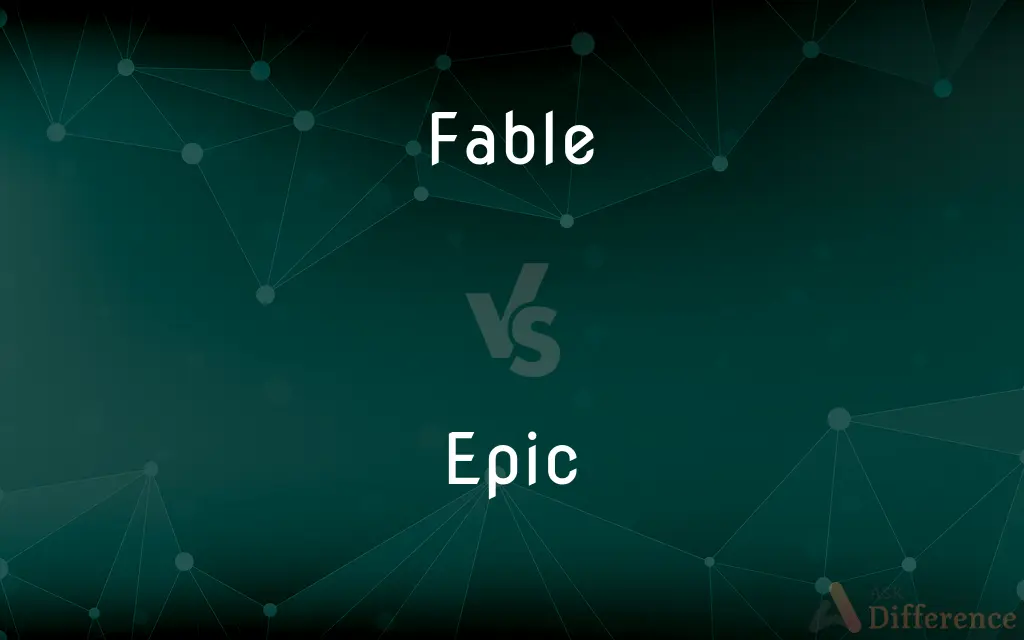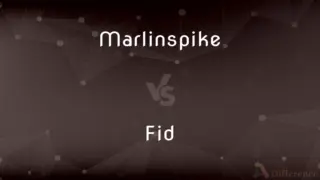Fable vs. Epic — What's the Difference?
By Tayyaba Rehman & Fiza Rafique — Updated on March 26, 2024
A fable is a short story, typically with animals as characters, conveying a moral lesson, while an epic is a lengthy narrative poem, often detailing heroic deeds and events of significant cultural importance.

Difference Between Fable and Epic
Table of Contents
ADVERTISEMENT
Key Differences
Fables are characterized by their brevity and purpose of imparting moral lessons, often through anthropomorphic animals that exhibit human traits. These stories are designed to be easily understood and are accessible to audiences of all ages, focusing on simple, yet profound, ethical or moral teachings. Whereas, epics are long narrative poems that delve into significant cultural, historical, or mythical events, centered around a hero's journey or monumental battles. These works are complex, involving elaborate plots, multiple characters, and profound themes reflecting the values and beliefs of a culture.
While fables use straightforward language and structure to ensure the moral of the story is clear and impactful, epics employ elevated language, detailed descriptions, and a formal style to evoke a sense of grandeur and timeless significance. On the other hand, epics serve not only to entertain but also to preserve historical memories, instill moral values, and foster a shared sense of identity among members of a culture.
Fables, given their succinct nature, are often utilized as educational tools, easily integrated into lessons about morality and character development for children. Epics, however, due to their length and complexity, are typically appreciated by older audiences capable of engaging with their deeper themes and historical or mythological references. These narratives offer insights into the human condition, exploring themes such as heroism, fate, and the struggle between good and evil.
The protagonists in fables are usually animals with human-like qualities, which serve to abstract and universalize the moral lessons, making them relatable across different cultures and times. In contrast, epic heroes are often legendary figures or demigods whose extraordinary abilities and moral dilemmas resonate with human aspirations and challenges, despite the fantastical elements of their stories.
Lastly, while fables end with a clear moral or lesson, epics often conclude with the resolution of a great conflict or the completion of a significant journey, leaving a lasting impact on the culture and literature. This distinction underscores the different purposes these genres serve: fables to teach ethical principles in a straightforward manner, and epics to celebrate the complexities of human experience and cultural heritage.
ADVERTISEMENT
Comparison Chart
Definition
A short story conveying a moral, often with animals as characters.
A lengthy narrative poem about heroic deeds of cultural significance.
Purpose
To impart moral lessons.
To narrate historical, cultural, or mythological events and heroism.
Characters
Anthropomorphic animals.
Legendary heroes, gods, and mythical creatures.
Language and Style
Simple and straightforward.
Elevated, detailed, and formal.
Audience
All ages, particularly children.
Older audiences, scholars, and those interested in culture and mythology.
Themes
Moral and ethical lessons.
Heroism, adventure, fate, the divine, and the human condition.
Length and Complexity
Short and simple.
Long and complex.
Cultural Significance
Universal moral teachings.
Preservation and celebration of cultural heritage.
Compare with Definitions
Fable
A short narrative illustrating a moral lesson, usually with animal characters.
The Tortoise and the Hare teaches the value of perseverance.
Epic
A long narrative poem celebrating heroic feats and cultural legends.
Homer's Odyssey recounts the hero Odysseus's long journey home after the Trojan War.
Fable
Utilizes anthropomorphic characters to reflect human behaviors.
In many fables, cunning foxes and diligent ants offer contrasting moral lessons.
Epic
Explores profound themes through legendary narratives.
The Mahabharata delves into themes of duty, righteousness, and the moral complexities of war.
Fable
Emphasizes a clear moral or teaching at the end.
The moral of the story is usually explicitly stated to ensure understanding.
Epic
Characterized by its formal structure and elevated style.
Epics often begin with an invocation to a muse and use dactylic hexameter.
Fable
Stories designed to teach ethical or moral lessons.
Aesop's Fables are classic examples that convey morals through animal characters.
Epic
Features extraordinary heroes and often divine intervention.
In many epics, gods and goddesses play crucial roles in the hero's journey.
Fable
Accessible and engaging for educational purposes.
Fables are often used in classrooms to introduce children to moral concepts.
Epic
Reflects and preserves the values and beliefs of a culture.
The Epic of Gilgamesh explores themes of friendship, the quest for immortality, and the value of human life.
Fable
Fable is a literary genre: a succinct fictional story, in prose or verse, that features animals, legendary creatures, plants, inanimate objects, or forces of nature that are anthropomorphized, and that illustrates or leads to a particular moral lesson (a "moral"), which may at the end be added explicitly as a concise maxim or saying. A fable differs from a parable in that the latter excludes animals, plants, inanimate objects, and forces of nature as actors that assume speech or other powers of humankind.
Epic
An extended narrative poem in elevated or dignified language, celebrating the feats of a legendary or traditional hero.
Fable
A usually short narrative making an edifying or cautionary point and often employing as characters animals that speak and act like humans.
Epic
A literary or dramatic composition that resembles an extended narrative poem celebrating heroic feats.
Fable
A story about legendary persons and exploits.
Epic
A series of events considered appropriate to an epic
The epic of the Old West.
Fable
A falsehood; a lie.
Epic
Of, constituting, having to do with, or suggestive of a literary epic
An epic poem.
Fable
To recount as if true.
Epic
Surpassing the usual or ordinary, particularly in scope or size
"A vast musical panorama ... it requires an epic musical understanding to do it justice" (Tim Page).
Fable
To compose fables.
Epic
Heroic and impressive in quality
"Here in the courtroom ... there was more of that epic atmosphere, the extra amperage of a special moment" (Scott Turow).
Fable
A fictitious narrative intended to enforce some useful truth or precept, usually with animals, etc. as characters; an apologue. Prototypically, Aesop's Fables.
Epic
An extended narrative poem in elevated or dignified language, celebrating the feats of a deity, demigod (heroic epic), other legend or traditional hero.
The Icelandic epic took all night to recite.
Fable
Any story told to excite wonder; common talk; the theme of talk.
Epic
A series of events considered appropriate to an epic.
The book was an epic in four volumes.
Fable
Fiction; untruth; falsehood.
Epic
(computing) In software development, a large or extended user story.
Fable
The plot, story, or connected series of events forming the subject of an epic or dramatic poem.
Epic
Of or relating to an epic.
Beowulf is an epic poem.
Fable
To compose fables; hence, to write or speak fiction; to write or utter what is not true.
Epic
Momentously heroic; grand in scale or character
The epic defense was rewarded with the highest military decorations
Fable
To make up; to devise, and speak of, as true or real; to tell of falsely; to recount in the form of a fable.
Epic
Extending beyond the usual or ordinary.
The after-prom party was truly epic.
You made an epic mistake.
Fable
A Feigned story or tale, intended to instruct or amuse; a fictitious narration intended to enforce some useful truth or precept; an apologue. See the Note under Apologue.
Jotham's fable of the trees is the oldest extant.
Epic
That is an epimorphism.
Fable
The plot, story, or connected series of events, forming the subject of an epic or dramatic poem.
The moral is the first business of the poet; this being formed, he contrives such a design or fable as may be most suitable to the moral.
Epic
Narrated in a grand style; pertaining to or designating a kind of narrative poem, usually called an heroic poem, in which real or fictitious events, usually the achievements of some hero, are narrated in an elevated style.
The epic poem treats of one great, complex action, in a grand style and with fullness of detail.
Fable
Any story told to excite wonder; common talk; the theme of talk.
We grewThe fable of the city where we dwelt.
Epic
A long narrative poem telling of a hero's deeds
Fable
Fiction; untruth; falsehood.
It would look like a fable to report that this gentleman gives away a great fortune by secret methods.
Epic
Very imposing or impressive; surpassing the ordinary (especially in size or scale);
An epic voyage
Of heroic proportions
Heroic sculpture
Fable
To compose fables; hence, to write or speak fiction ; to write or utter what is not true.
Vain now the tales which fabling poets tell.
He fables, yet speaks truth.
Epic
Constituting or having to do with or suggestive of a literary epic;
Epic tradition
Fable
To feign; to invent; to devise, and speak of, as true or real; to tell of falsely.
The hell thou fablest.
Fable
A deliberately false or improbable account
Fable
A short moral story (often with animal characters)
Fable
A story about mythical or supernatural beings or events
Common Curiosities
What is a fable?
A fable is a short story, typically with animals as characters, that teaches a moral lesson.
Are fables relevant to adults?
Yes, while fables are accessible to children, their universal moral lessons remain relevant to adults.
How is the language in epics different from fables?
Epics use elevated, formal language and detailed descriptions, while fables employ simple, straightforward language.
Why do fables use animals as characters?
Animals are used to abstract and universalize lessons, making them relatable across cultures and generations.
Do epics always feature warfare and conflict?
Many epics involve conflict, whether physical battles or inner struggles, as they reflect on human experiences and values.
How do fables and epics differ in purpose?
Fables aim to teach moral lessons in a straightforward manner, while epics celebrate cultural heritage and explore complex themes.
Can the moral of a fable be debated?
While the morals are usually clear, interpretations can vary, allowing for discussion and deeper insights.
What defines an epic?
An epic is a lengthy narrative poem detailing heroic deeds and culturally significant events, often featuring legendary figures.
Can epics be based on true stories?
Yes, some epics are rooted in historical events but are often embellished with mythical elements and legendary heroism.
What makes an epic culturally significant?
Epics encapsulate and transmit the values, beliefs, and historical memories of a culture, often serving as foundational texts.
Share Your Discovery

Previous Comparison
Marlinspike vs. Fid
Next Comparison
Painful vs. HurtfulAuthor Spotlight
Written by
Tayyaba RehmanTayyaba Rehman is a distinguished writer, currently serving as a primary contributor to askdifference.com. As a researcher in semantics and etymology, Tayyaba's passion for the complexity of languages and their distinctions has found a perfect home on the platform. Tayyaba delves into the intricacies of language, distinguishing between commonly confused words and phrases, thereby providing clarity for readers worldwide.
Co-written by
Fiza RafiqueFiza Rafique is a skilled content writer at AskDifference.com, where she meticulously refines and enhances written pieces. Drawing from her vast editorial expertise, Fiza ensures clarity, accuracy, and precision in every article. Passionate about language, she continually seeks to elevate the quality of content for readers worldwide.













































